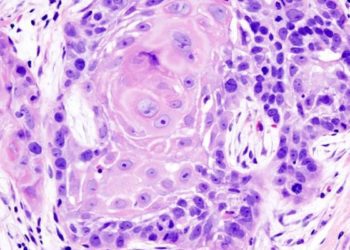Bimekizumab is tolerable and efficacious for patients with moderate to severe plaque psoriasis
1. 91% of patients receiving bimekizumab 320 mg every 4 weeks achieved ≥ 90% improvement from baseline in the Psoriasis Area Severity Index (PASI90) compared to 1% receiving placebo.
2. After achieving PASI90 at week 16, bimekizumab response was maintained through week 56 in both dosing schedules (every 4 weeks and every 8 weeks).
Evidence Rating Level: 1 (Excellent)
Study Rundown: Chronic, systemic inflammatory diseases such as plaque psoriasis can have a negative impact on quality of life. Biologics are often used as primary treatment for psoriasis; however, factors such as poor adherence, acute illness, and discontinuation of drug may exacerbate outcomes in these patients. Bimekizumab, an inhibitor of IL-17F and IL-17A, has shown promise in the treatment of moderate to severe psoriasis. This multicenter, randomized controlled trial compared the efficacy and safety of bimekizumab in patients with moderate to severe psoriasis, the effects of treatment withdrawal, and two maintenance dosing schedules over 56 weeks. Coprimary endpoints were the proportion of patients achieving ≥ 90% improvement from baseline in the Psoriasis Area Severity Index (PASI90) and the proportion of patients achieving 0 (clear) or 1 (almost clear) on the Investigator’s Global Assessment (IGA) scale at week 16. Compared to placebo, patients in the bimekizumab group reported a significant improvement in psoriasis from baseline to week 16, using both the PASI90 and IGA criteria. Although treatment-emergent adverse events were more frequent in the bimekizumab group compared to the placebo group initially (week 1 to week 16), this was not the case later on (week 16 to week 56). This study was limited by a disproportionate sample size between both groups as the number of patients assigned to the bimekizumab group was four times that of patients in the placebo group. Nonetheless, findings suggest that bimekizumab demonstrates a rapid response that is maintained for up to at least one year with varying dosing intervals.
Click to read the study in The Lancet
In-depth [randomized controlled trial]: Between Feb 5, 2018, and Jan 7, 2020, 576 patients were assessed for eligibility across 77 study sites in nine countries. Included were those aged 18 years and older, with moderate to severe plaque psoriasis (PASI ≥ 12 and IGA ≥ 3) for at least 6 months. Patients were ineligible, withdrew consent, or were lost to follow-up were excluded. Altogether, 435 patients (349 in the bimekizumab group and 86 in the placebo group) were enrolled in the study. Demographics and baseline characteristics were similar between both treatment groups. Among enrolled patients, the mean age was 44.3 years (standard deviation [SD] 12.9) and 72% (313 of 435) were male.
At week 16, significantly more patients in the bimekizumab every 4 weeks group (91%, 317 of 349) achieved PASI90 compared to the placebo group (1%, 1 of 86, risk difference 89.8, 95% confidence interval [CI] 86.1-93.4, p<0.0001). This was also the case for an IGA score of 0 or 1 on a five-point scale (93%, 323 of 349 patients in the bimekizumab every 4 weeks group vs. 1%, 1 of 86 patients in the placebo group, risk difference 91.5%, 95% CI 88.0-94.9, p<0.0001). Patients who achieved PASI90 on bimekizumab at week 16 were then randomized to continue the 4-week dosing schedule, receive bimekizumab every 8 weeks, or receive placebo every 4 weeks. After 56 weeks, bimekizumab response was maintained in both the 4- and 8-week dosing intervals with greater proportions of patients achieving PASI90 compared to placebo (p<0.0001). Use of bimekizumab resulted in considerably more treatment-emergent adverse events from baseline to week 16 (61% in the bimekizumab every 4 weeks group vs. 41% in the placebo group). This trend persisted from week 16 to week 56, although the difference in treatment-emergent adverse events was smaller than before (74% in bimekizumab every 4 weeks vs. 77% in bimekizumab every 8 weeks vs. 69% in placebo). However, there were no cases of serious adverse events such as hypersensitivity reactions, irritable bowel disease, or active tuberculosis. Overall, findings from this study suggest that bimekizumab was well-tolerated, with no unexpected safety findings and high levels of clinical response over 56 weeks.
Image: PD
©2021 2 Minute Medicine, Inc. All rights reserved. No works may be reproduced without expressed written consent from 2 Minute Medicine, Inc. Inquire about licensing here. No article should be construed as medical advice and is not intended as such by the authors or by 2 Minute Medicine, Inc.







